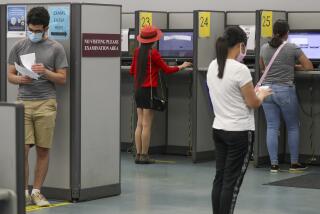Teenage Motorists Are Often Steered by Parents’ Example
- Share via
Parents, if you are reckless behind the wheel, chances are your little ones will grow up to be just as cavalier as you.
A recent study by the Insurance Institute for Highway Safety, a nonprofit group funded by auto insurers, suggests that parents wield enormous influence over the kind of drivers their children become.
Using data from the 1996 driving records of 155,349 teenagers and their parents in North Carolina, the study concluded that “parents with crashes and violations are more likely to have children with crashes and violations,” said Susan Ferguson, vice president of the Arlington, Va.-based institute.
Teenage drivers whose parents had three or more crashes on their records were 22% more likely to be involved in at least one crash than teens whose parents had no crashes, the study found.
In addition, the research showed that teens whose parents had three or more violations on their driving records were 38% more likely to have a violation than teens whose parents had none.
*
The results are important because as California and other states have implemented graduated licensing to give teens more experience behind the wheel before they can drive alone, parents are expected to play a more critical role in driver training.
“Parents must remember they are being watched and imitated,” said Julie Rochman, a spokeswoman for the insurance institute.
Under California driving restrictions that went into effect in July 1998, new drivers ages 16 to 18 must hold the learner’s permit for at least six months and a parent or guardian must certify that the aspiring driver has completed 50 hours of practice, including 10 hours at night.
That means parents are responsible for 50 hours of supervising teens’ driving and enforcing these driving restrictions.
“Of course, not all parents are going to be ideal teachers or supervisors as their children learn to drive,” Ferguson said.
If kids observe their parents racking up speeding tickets, tailgating, sailing through stop signs or driving under the influence of alcohol or drugs, they may do the same when they get the keys to the car.
Through the years, various studies have linked teenagers’ reckless driving and accidents to such factors as rebelliousness, alienation, drug and alcohol use and even poor academic performance.
But the new study’s findings on the effects of parents’ driving habits should make parents doubly cautious about how they drive.
In 1998, 152 teenage drivers were killed and 17,543 were injured in vehicle crashes in California, according to the Automobile Club of Southern California. Although 15- to 19-year-olds make up only 4% of licensed drivers, they are the drivers in 9% of fatal crashes and 10% of injury crashes, an Auto Club study determined.
*
Masoud Khoshbakhtian, owner of K-1 Driving School in Long Beach, praises the graduated licensing system for requiring teens to get more practice behind the wheel. But he doubts that every parent spends the required 50 hours driving with their children.
“Parents should be a good example for the kids. Many are; some are not,” Khoshbakhtian said. Sometimes, he noted, his teenage students complete the training and go on to correct their parents’ bad driving habits.
So next time you hop in the car with your children, don’t burn rubber down the street. Remember, by driving safely, you are teaching your children a lesson that may save their lives someday.
*
Jeanne Wright cannot answer mail personally but responds in this column to automotive questions of general interest. Write to Your Wheels, Business Section, Los Angeles Times, Times Mirror Square, Los Angeles, CA 90053. E-mail: [email protected].
More to Read
Sign up for Essential California
The most important California stories and recommendations in your inbox every morning.
You may occasionally receive promotional content from the Los Angeles Times.










